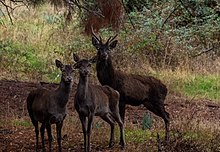The Barbary stag (Cervus elaphus barbarus), also known as the Atlas deer or African elk, is a subspecies of the red deer that is native to North Africa. It is the only deer known to be native to Africa, aside from Megaceroides algericus, which went extinct approximately 6,000 years ago.[2]
| Barbary stag | |
|---|---|

| |
| A herd at El Feidja National Park | |
| Scientific classification | |
| Domain: | Eukaryota |
| Kingdom: | Animalia |
| Phylum: | Chordata |
| Class: | Mammalia |
| Order: | Artiodactyla |
| Family: | Cervidae |
| Genus: | Cervus |
| Species: | |
| Subspecies: | C. e. barbarus
|
| Trinomial name | |
| Cervus elaphus barbarus Bennett, 1833[1]
| |
| Synonyms | |
|
Cervus barbarus | |
Description
editThe Barbary stag is smaller than the typical red deer. Its body is dark brown with some white spots on its flanks and back. The antlers lack the bez (second) tine.
Range/habitat
editThe Barbary stag is the only member of the deer family that is native to Africa. It thrives in dense, humid forested areas of Algeria, Tunisia and Morocco.[3] It had initially been hunted to extinction in the latter, but specimens from the Tunisian population were reintroduced in the 1990s.[3] One population can be found in Tazekka National Park in the Middle Atlas Mountains.[4]
Nomenclature
editRecent genetic studies indicate that the North African red deer population is practically indistinguishable from the Sardinian and Corsican populations, generally referred to as the Corsican red deer. This strongly argues for an ancient introduction of red deer from North Africa to these Mediterranean islands by humans. Further analysis suggests that the Barbary stag, including the Corsican red deer, belongs to a separate species, and should be grouped under the name Cervus corsicanus.[3]
Predators
editPredators of the Barbary stag include, or included, the Barbary lion, the Atlas bear, the Barbary leopard, and the African wolf, but these have become either endangered or extinct in the region where the Barbary stag occurs.
References
edit- ^ Grubb, P. (2005). "Cervus elaphus barbarus". In Wilson, D.E.; Reeder, D.M (eds.). Mammal Species of the World: A Taxonomic and Geographic Reference (3rd ed.). Johns Hopkins University Press. p. 663. ISBN 978-0-8018-8221-0. OCLC 62265494.
- ^ Fernandez, Philippe; Bouzouggar, Abdeljalil; Collina-Girard, Jacques; Coulon, Mathieu (July 2015). "The last occurrence of Megaceroides algericus Lyddekker, 1890 (Mammalia, Cervidae) during the middle Holocene in the cave of Bizmoune (Morocco, Essaouira region)". Quaternary International. 374: 154–167. Bibcode:2015QuInt.374..154F. doi:10.1016/j.quaint.2015.03.034. ISSN 1040-6182.
- ^ a b c Le programme d'espèces d'UICN et la Commission UICN de la sauvegarde des espèces et TRAFFIC. "Résumés des Analyses UICN/TRAFFIC des propositions d'amendement aux Annexes de la CITES pour la Quatorzième session de la Conférence des Parties", Retrieved on 2008-12-28.
- ^ Flora and Fauna - Park National de Tazekka, (official web page of the National Park).
External links
edit- US Fish & Wildlife Service entry for the Barbary stag[permanent dead link]
- Description (Spanish)
- Inclusion of Cervus elaphus barbarus (Atlas deer) in Appendix I of CITES Archived 2010-06-15 at the Wayback Machine (with a description of this species)